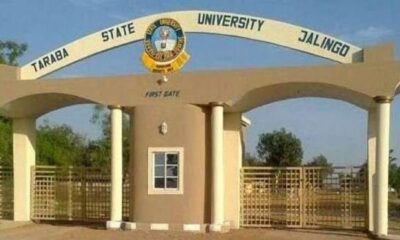Education
Review hike in school fees, ASUU president, others advise FG

Review hike in school fees, ASUU president, others advise FG
The National President, Academic Staff Union of Universities (ASUU), Prof. Emmanuel Osodeke, has urged the Federal Government to review the hike in fees in its schools.
He urged the government to do so and find a safe landing for the nation’s future leaders.
Osodeke was speaking against the backdrop of the recent hike in fess of Unity Colleges and some first generation public tertiary institutions in the country.
He told the News Agency of Nigeria (NAN) in an interview on Sunday in Lagos that the hike in fees could be counterproductive.
Recall that the University of Lagos was the latest of the public universities to increase its fees from N25,000 to almost N200,000, depending on programme.
The university had announced an adjustment in the obligatory fees for both returning and new students of the institution, with effect from Sept 1, for the 2023/2024 academic session.
A breakdown of the fees by the institution showed that the mandatory charges for one academic session for new undergraduate students are N126, 325, for courses without laboratory/studio.
READ ALSO:
- #Endsars: Lagos explains N62m approval for 103 victims mass burial
- 20 BBN housemates ushered in for All Stars edition
- Gunmen attack ex-Information minister Maku’s house in Nasarawa
It also approved N176,325 as mandatory charges for one academic session for courses with laboratory and studio.
A further breakdown of the approved mandatory charges for one academic year for returning students showed N100,750 for courses without laboratory and studio, while approved mandatory charges for courses with laboratory and studio was N140,250.
Approved charges for Medical students was put at N190,250.
The institution also fixed N20,000 as utility charge to be paid by all undergraduate students, while a total of N30,000 was to be paid by all final year students.
According to the university, the review came after careful deliberations with its stakeholders (students, parents/guardians, staff unions, alumni among others).
It had explained that the adjustment in fees was in view of the prevailing economic realities, for it to be able to meet its obligations to its students, staff and municipal service providers among others.
Osodeke said that the best way out to issues was to adopt holistic approach, noting that policies should be people centred.
“I think the whole thing now boils down to the parents. These have been part of our agitations. We were fighting on the need to right some wrongs, but rather than get support, we were attacked.
“It may interest you to know that UNILAG is not the only tertiary institution that has hiked fees in recent times.
“The likes of Bayero University Kano, Benin and Abuja among others, have all done the same. What this will translate to, is for children of the poor to withdraw from school.
“However, we should be mindful of the inherent danger that may accompany such development, when it comes to vices, especially among youth. It could become a willing pool to recruit from. It is indeed sad.
READ ALSO:
- [BREAKING] Recruitment: NDLEA releases names of successful candidate, see full list
- Elon Musk moves to replace bird-shaped Twitter emblem with “X”
- Expect more pain but gains will come in Q1 2024 – Rewane
“We hope the current administration will review the whole situation and find a safe landing for these our future leaders.
‘Government could set up a high-powered commission, made up of people of integrity and brain, to review all the issues, as it concerns the country’s education sector. And like I said, it has been done in the past,” the unionist said.
Also reacting, one of the students of the institution who pleaded anonymity, called on well meaning Nigerians to prevail on President Bola Tinubu to urgently intervene on the situation.
The 400 level student of the Faculty of Engineering told NAN that the hike in fees could mean the end of his academic pursuit as he was responsible for his education.
“I used to do menial jobs to see myself through school, especially during vacation. Sometimes I do night guard in some establishments around.
”My parents are both not too strong and hence I took up the challenge to do something for myself, so that at the end, I will be able to take care of my siblings and my parents too.
“Even before now, it has not been easy. With the current increase, what do I do, where do I start from, who do I run to. Should I just allow all I have been able to achieve getting to this level go down the drain?. I may not be able to stand this,” he said.
A prospective student, who gave her name simply as Mercy, said her parents were already having a second thought concerning her joining the institution, following the increase in fees.
According to her, the situation has thrown the family into confusion, as it is becoming increasingly clear that her parents may not be able to meet up with such demands, considering the current economic realities in the country.
Mercy, who had been given placement in the institution to study Pharmacy, noted that she may lose the opportunity and opt for skills acquisition.
“My parents had supported me to this stage and were positive about seeing me through the university, even from their meagre resources but with this current hike in fees, it is clear that my dreams for academic progression may no longer materialise,” she said.
Another student who also pleaded anonymity appealed to the Federal Government to reconsider the fees, as the development could have unintended consequences.
The final year student of Accounting urged government to plough back recovered government funds into the education sector, to bring relief to parents, especially in the face of the ripple effect of the subsidy removal.(NAN)
Education
Reasons Behind UniAbuja’s Expulsion of 28 Students, Withdrawal of 15 Certificates

Reasons Behind UniAbuja’s Expulsion of 28 Students, Withdrawal of 15 Certificates
The University of Abuja (UniAbuja), now renamed Yakubu Gowon University, has expelled 28 students and revoked certificates of 15 graduates following findings of serious academic and disciplinary violations.
The decision was made at the 191st Regular Meeting of the University Senate held on Thursday, January 28, 2026, after reviewing reports and recommendations from the Student Disciplinary Committee (SDC).
Reasons for Expulsion and Certificate Withdrawal
According to a statement signed by Dr. Habib Yakoob, Acting Director of Information and University Relations, the students were found guilty of offences including threats to life, physical assault, examination malpractice, conspiracy, burglary, theft, cult-related activities, possession and use of hard drugs, and falsification of O’Level results submitted during admission. Some students also failed to appear before the committee despite repeated invitations.
The 15 graduates had their certificates withdrawn for similar non-compliance, rendering their credentials null and void. Meanwhile, nine students were cleared after investigations, and 33 others received formal warnings for infractions including conspiracy, hostel racketeering, and fighting.
READ ALSO:
- Yoruba Muslim Group Dismisses Viral Ramadan Date Claim, Reaffirms Sultan of Sokoto’s Authority
- FCT Council polls: APC Wins Four Chairmanship Seats as PDP Takes Gwagwalada
- Dangote Opens Refinery Investment to Nigerians With Public Share Sale Plans
University’s Commitment to Discipline
The Vice-Chancellor and Chairman of Senate, Professor Hakeem Babatunde Fawehinmi, reaffirmed the university’s dedication to maintaining a safe, disciplined, and conducive learning environment. He emphasised that academic integrity is a core principle and that violations would be sanctioned without compromise.
Professor Fawehinmi praised the SDC for its thorough and diligent handling of cases and urged students to conduct themselves responsibly to safeguard their academic futures. He also highlighted ongoing university initiatives, including student engagement, counselling, and orientation programmes, aimed at preventing misconduct and promoting responsible citizenship and academic excellence.
The university described the actions as part of a zero-tolerance approach to misconduct, reinforcing its commitment to upholding high moral and academic standards on campus.
Reasons Behind UniAbuja’s Expulsion of 28 Students, Withdrawal of 15 Certificates
Education
UTME: JAMB Clarifies Position on Hijab During Biometric Capture

UTME: JAMB Clarifies Position on Hijab During Biometric Capture
The Joint Admissions and Matriculation Board (JAMB) has clarified that candidates are not required to remove their hijab during the Unified Tertiary Matriculation Examination (UTME) registration process.
The examination body issued the clarification following the circulation of a viral video alleging that a Muslim candidate was compelled to remove her hijab before capturing her biometric photograph at a registration centre.
In a statement addressing the controversy, JAMB dismissed claims of a policy prohibiting the use of hijab, describing such reports as misleading. The board reiterated that it respects candidates’ religious rights and does not mandate the removal of religious head coverings during registration.
READ ALSO:
- ₦13.7bn Payroll Fraud Claim Pits Audit Firm Against Osun Government
- Breaking: INEC Declares APC’s Joshua Ishaku Winner of Bwari Chairmanship Election
- FCT Poll: APC’s Maikalangu Wins AMAC Chairmanship as Collation Continues
However, JAMB explained that during biometric data capture, candidates may be asked to adjust their head coverings slightly to ensure that key facial features are visible for proper identification. According to the board, this requirement is strictly for technical purposes and aligns with standard identification procedures used in official documentation processes.
The board emphasized that the adjustment does not equate to a ban on hijabs, noting that clear visibility of facial features is necessary to meet biometric verification standards and prevent identity-related issues.
JAMB urged the public to disregard misinformation and advised candidates and parents to seek clarification through official communication channels to avoid unnecessary panic.
The clarification comes amid growing public interest in ensuring that examination procedures remain inclusive while maintaining the integrity of the registration and identification process.
UTME: JAMB Clarifies Position on Hijab During Biometric Capture
Education
Ogun Gov Rewards Nigeria’s Best Primary School Teacher with Car, Bungalow

Ogun Gov Rewards Nigeria’s Best Primary School Teacher with Car, Bungalow

Ogun Gov Rewards Nigeria’s Best Primary School Teacher Solanke Francis Taiwo with Car and Bungalow
The Ogun State Governor, Dapo Abiodun, has honoured Mr Solanke Francis Taiwo, a primary school teacher at Ansa‑Ur‑Deen Main School I, Kemta Lawa, Abeokuta, with a brand new car and a two‑bedroom bungalow in recognition of his achievement as Nigeria’s Overall Best Primary School Teacher for the 2025/2026 academic year.
The presentation took place at the Governor’s Office in Oke‑Mosan, Abeokuta, with the Commissioner for Education, Science and Technology, Prof Abayomi Arigbagbu, and the ministry’s Permanent Secretary, Mr Oloko, in attendance. The gifts were part of a broader effort to motivate teachers, reward professional excellence, and highlight the state’s education reforms.
Speaking at the event, Prof Arigbagbu said the award demonstrates the effectiveness of the Ogun State Education Revitalisation Agenda, which is built on six pillars including curriculum enhancement, school administration, innovation, infrastructure, funding, and teachers’ welfare. “When you do things consistently and efficiently, you record results. This same teacher won the Ogun State Best Teacher Award in October before clinching the national award in Abuja. This confirms that our education sector has been truly revitalised,” he said.
READ ALSO:
- Police Bust Gang Armoury, Arrest Two Suspects in Delta
- Peter Obi Launches ‘Village Boys Movement’ to Rival Tinubu’s City Boys Ahead of 2027
- Woman Dies in Bandits’ Camp After Family Pays ₦25 Million Ransom

Ogun Gov Rewards Nigeria’s Best Primary School Teacher Solanke Francis Taiwo with Car and Bungalow
He highlighted the state’s successes in national competitions, including the JETS contests, where Ogun students won 18 out of 24 awards in one year, with a single student claiming nine prizes. The commissioner also noted that Ogun’s Technical and Vocational Education and Training (TVET) model and education digitisation initiatives have attracted attention from other states and received commendation from the Federal Government and the National Board for Technical Education.
Governor Abiodun reaffirmed his commitment to teacher development, pledging continuous support through workshops, seminars, digital learning platforms, and AI-powered instructional tools. He said the gifts of a car and bungalow are intended to inspire other educators to strive for excellence and innovation in their teaching.
In his remarks, Mr Solanke expressed gratitude to the governor and the education ministry for fostering an enabling environment for teaching and learning. He vowed to continue improving student learning outcomes and collaborating with colleagues to ensure that Ogun State remains a leader in education excellence.
“I feel fulfilled and honoured. I will continue to give my best and encourage fellow teachers to remain dedicated to nurturing the potential of every student,” he said.
The recognition of Mr Solanke reflects Ogun State’s strategic investment in education, commitment to teacher welfare, and the effectiveness of policies that have positioned the state as a model for academic excellence in Nigeria.
Ogun Gov Rewards Nigeria’s Best Primary School Teacher with Car, Bungalow
-

 Business17 hours ago
Business17 hours agoDangote Opens Refinery Investment to Nigerians With Public Share Sale Plans
-

 Politics2 days ago
Politics2 days agoPeter Obi Launches ‘Village Boys Movement’ to Rival Tinubu’s City Boys Ahead of 2027
-

 Education1 day ago
Education1 day agoUTME: JAMB Clarifies Position on Hijab During Biometric Capture
-

 News3 days ago
News3 days agoPolice to Arrest TikToker Mirabel After She Recants False Rape Claim
-

 International3 days ago
International3 days agoEpstein, Ex-Israeli PM Named in Alleged Profiteering From Boko Haram Crisis
-

 Politics10 hours ago
Politics10 hours agoTinubu Hails Wike as APC Dominates 2026 FCT Area Council Elections
-

 Education2 days ago
Education2 days agoOgun Gov Rewards Nigeria’s Best Primary School Teacher with Car, Bungalow
-

 Entertainment2 days ago
Entertainment2 days agoTacha Condemns False Rape Allegations After Mirabel Admits Fabrication















